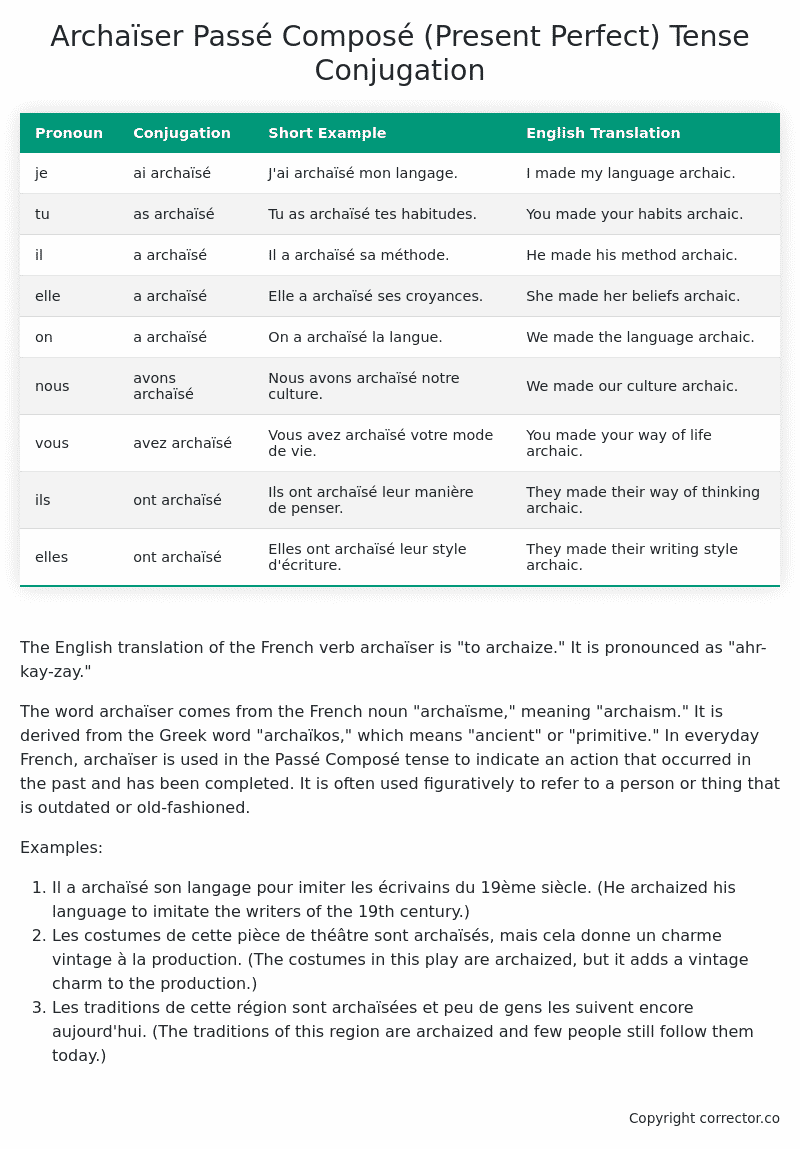Passé Composé (Present Perfect) Tense Conjugation of the French Verb archaïser
Introduction to the verb archaïser
The English translation of the French verb archaïser is “to archaize.” It is pronounced as “ahr-kay-zay.”
The word archaïser comes from the French noun “archaïsme,” meaning “archaism.” It is derived from the Greek word “archaïkos,” which means “ancient” or “primitive.” In everyday French, archaïser is used in the Passé Composé tense to indicate an action that occurred in the past and has been completed. It is often used figuratively to refer to a person or thing that is outdated or old-fashioned.
Examples:
- Il a archaïsé son langage pour imiter les écrivains du 19ème siècle. (He archaized his language to imitate the writers of the 19th century.)
- Les costumes de cette pièce de théâtre sont archaïsés, mais cela donne un charme vintage à la production. (The costumes in this play are archaized, but it adds a vintage charm to the production.)
- Les traditions de cette région sont archaïsées et peu de gens les suivent encore aujourd’hui. (The traditions of this region are archaized and few people still follow them today.)
Table of the Passé Composé (Present Perfect) Tense Conjugation of archaïser
| Pronoun | Conjugation | Short Example | English Translation |
|---|---|---|---|
| je | ai archaïsé | J’ai archaïsé mon langage. | I made my language archaic. |
| tu | as archaïsé | Tu as archaïsé tes habitudes. | You made your habits archaic. |
| il | a archaïsé | Il a archaïsé sa méthode. | He made his method archaic. |
| elle | a archaïsé | Elle a archaïsé ses croyances. | She made her beliefs archaic. |
| on | a archaïsé | On a archaïsé la langue. | We made the language archaic. |
| nous | avons archaïsé | Nous avons archaïsé notre culture. | We made our culture archaic. |
| vous | avez archaïsé | Vous avez archaïsé votre mode de vie. | You made your way of life archaic. |
| ils | ont archaïsé | Ils ont archaïsé leur manière de penser. | They made their way of thinking archaic. |
| elles | ont archaïsé | Elles ont archaïsé leur style d’écriture. | They made their writing style archaic. |
Other Conjugations for Archaïser.
Le Present (Present Tense) Conjugation of the French Verb archaïser
Imparfait (Imperfect) Tense Conjugation of the French Verb archaïser
Passé Simple (Simple Past) Tense Conjugation of the French Verb archaïser
Passé Composé (Present Perfect) Tense Conjugation of the French Verb archaïser (this article)
Futur Simple (Simple Future) Tense Conjugation of the French Verb archaïser
Futur Proche (Near Future) Tense Conjugation of the French Verb archaïser
Plus-que-parfait (Pluperfect) Tense Conjugation of the French Verb archaïser
Passé Antérieur (Past Anterior) Tense Conjugation of the French Verb archaïser
Futur Antérieur (Future Anterior) Tense Conjugation of the French Verb archaïser
Subjonctif Présent (Subjunctive Present) Tense Conjugation of the French Verb archaïser
Subjonctif Passé (Subjunctive Past) Tense Conjugation of the French Verb archaïser
Subjonctif Imparfait (Subjunctive Imperfect) Tense Conjugation of the French Verb archaïser
Subjonctif Plus-que-parfait (Subjunctive Pluperfect) Tense Conjugation of the French Verb archaïser
Conditionnel Présent (Conditional Present) Tense Conjugation of the French Verb archaïser
Conditionnel Passé (Conditional Past) Tense Conjugation of the French Verb archaïser
L’impératif Présent (Imperative Present) Tense Conjugation of the French Verb archaïser
L’infinitif Présent (Infinitive Present) Tense Conjugation of the French Verb archaïser
Struggling with French verbs or the language in general? Why not use our free French Grammar Checker – no registration required!
Get a FREE Download Study Sheet of this Conjugation 🔥
Simply right click the image below, click “save image” and get your free reference for the archaïser present perfect tense conjugation!

Archaïser – About the French Passé Composé (Present Perfect) Tense
Formation of the Passé Composé
Set the auxiliary verb with either
Conjugate the auxiliary verb
Add the past participle
Common everyday usage patterns
Narrating Past Events
Sequential Actions
Describing Completed Actions
Interactions with other tenses
Imperfect Tense
Conditional and Future Tenses
Summary
I hope you enjoyed this article on the verb archaïser. Still in a learning mood? Check out another TOTALLY random French verb conjugation!


